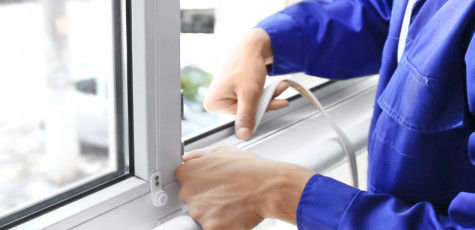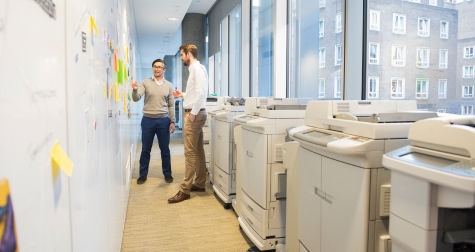Winter
Keep Energy Usage & Costs Down When Temperatures Drop
According to ENERGY STAR®, small businesses across the nation spend more than $60 billion each year on energy costs due to weather. Here in Michigan, cold winter temperatures may cause your company’s energy consumption to increase in various ways.
Factors That Impact Winter Bills
(Hover Over Icons)
1. More Energy Usage
2. Fluctuations in Temps
3. Shifts in Behavior
4. Type of Building
Safeguard Your Business This Winter
Safety is always our number one priority.

Do you smell natural gas?
If you smell or suspect a gas leak, leave the area immediately. Once you are in a safe place, call 911 and then call our Gas Leak Hotline at (800) 947-5000.

Test Smoke & Carbon Monoxide Detectors
Routine testing is critical throughout the winter and all year long. Be sure to check expiration dates on devices annually.

Use Portable Space Heaters Wisely
If your workspace requires the use of portable space heaters, make sure employees know how to operate them safely.

Practice Plug Safety
If you must use an extension cord, make sure it’s the right capacity for the tool or appliance with which it’s used. Use grounded (three-prong) extension cords for outdoor tools and holiday decorations.
Understanding Your Bill
Invest In Your Bottom Line
Managing building repairs and purchasing energy-efficient equipment, electronics, and lighting can deliver year-over-year savings for your business.
Know Your Company's Supplier
Michigan natural gas customers have a choice when it comes to their natural gas supplier. That can affect your company's energy rate.
Have concerns about your winter energy bill?
If you are experiencing an issue or are dissatisfied with your service, please submit your concern and someone from our team will follow up. Once your situation is resolved, we invite you to leave a compliment for our team.
Winter
Keep Energy Usage & Costs Down When Temperatures Drop
Practical Tips for an Energy-Efficient Winter
Frequently Asked Heating Questions
Contact our Business Center directly by calling (855) DTE-4BIZ or (855) 383-4249 with any questions or if you need help paying your monthly energy bill.
We have many convenient payment programs available for small business owners. Our Flexible Due Date service lets you choose your bill’s monthly due date between the 1st and 28th day of the month.
Payment Agreement gives eligible commercial business partners the option to make installment payments on an active account over a specific period, including any current charges. Shutoff Protection Plan (SPP) for nonprofit organizations is a year-round payment program designed to assist nonprofit business partners who are falling behind on their bills. Call our Business Center at (855) 353-4249 if you need help paying your monthly energy bills.
Yes. If your business uses a gas furnace for heating, the only electrical cost will be what is required to operate the fan motor and igniter. The igniter lights the flame for a moment when the furnace starts up.
Generally, in the winter, you should adjust your workplace thermostat by a few degrees after business hours to conserve energy and keep pipes from freezing. You can save up to 3% for each degree the thermostat is lowered.







